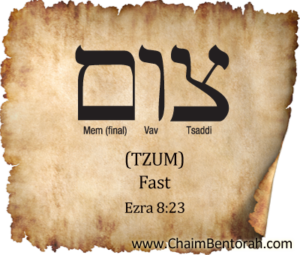Hebrew Word Study – Fast – Tzum – Sade Vav Mem
Ezra 8:23: So we fast and sought our God for this and He was entreated of us.”
 Ezra was leading the captives back to Israel. Before the journey, he proclaims a fast for a safe journey. Ezra was facing a little problem The Persian king sanctioned this move back to Israel and offered to provide military troops to ride with the Israelites as protection on their journey. Ezra told the king; “Naw, we don’t need your troops, God will protect us.” After all, Ezra wanted to make sure the king and everyone understood that this return was of God and not man. Then when Ezra faced the realities of this journey he realized why the king offered to send troops along to protect the people and Ezra began to think: “What have I done?” At first reading, this appears to be the case, but in taking a closer look at this passage and reading it in the Hebrew, I get a different picture.
Ezra was leading the captives back to Israel. Before the journey, he proclaims a fast for a safe journey. Ezra was facing a little problem The Persian king sanctioned this move back to Israel and offered to provide military troops to ride with the Israelites as protection on their journey. Ezra told the king; “Naw, we don’t need your troops, God will protect us.” After all, Ezra wanted to make sure the king and everyone understood that this return was of God and not man. Then when Ezra faced the realities of this journey he realized why the king offered to send troops along to protect the people and Ezra began to think: “What have I done?” At first reading, this appears to be the case, but in taking a closer look at this passage and reading it in the Hebrew, I get a different picture.
The so-called “Ezra Fast” is considered a fast to resolve problems. It would seem that
Ezra called for a fast, not so much as to resolve problems as to confirm this was God’s journey they were making and they wanted Him to confirm that He was a part of this journey. Actually, as I read this passage it appears Ezra’s concern is not so much for safety. Ezra’s faith seemed to be intact. The rest of the people, not so much. His concern seems to be that everyone understands that this move was of God and not of man and that God would protect them and give them travelin’ mercies.
The word used for fast here is tzsum which basically means to put a cover over your mouth. In other words, this is a food fast. The word is spelled Sade, Vav, Final Mem. The letters used and their meanings will actually give us the reason for this type of fast. The Sade represents humility, the Vav represents a connection from earth to heaven. And the final Mem represents the hidden knowledge of God. In this case, there was so much human effort involved in preparation for this journey that people almost forgot that God was behind this move. The fasting was merely an act of humility and an outward recognition and confirmation that this whole operation was the workings of God and not man.
Would you like Chaim Bentorah as your personal Hebrew teacher?
|
|
Ezra says they sought God on this matter. It stood to reason that if God was really behind this move and not man, they did not have to pray for travelin’ mercies, that would be assured Again they sought the Lord to just confirm their understanding that they were only following God’s direction. The word sought is baqash which is to seek or ask but when used in relationship to God it is also an act of worship. Note too, this is in a Piel form with a paragogic Hei. In other words, Ezra seeking God is something very intense, more than just table grace. The people just did not simply join hands and ask for travelin’ mercies, but they went into serious worship before God. Everyone had to be on board with this decision to decline the king’s offer of military protection.
What is really interesting is that even the mere asking or petitioning God is a form of worship. A woman once observed Delacroix’s painting of an “Indian Woman Bitten By A Tiger” and noted to Delacroix that the woman appeared to be smiling. Delacroix commented that was because she was glad to feel something. It would seem that even if we go to God with nothing but petitions, at least we are communicating or speaking with Him and that can be worship. Worship does not have to be a well-orchestrated, rehearsed ceremony with flowery words. Worship can be just a simple form of going to God in humility and acknowledging him in all things.
This is what Ezra 8:23 is all about. The people were not just asking for travelin’ mercies, they turned their journey into a time of worship. God responded by “entreating them.” Some translations render this as listening to them or answering them. The word in Hebrew is ‘atar which has the idea of becoming favorable. It is in a Niphal form thus would mean that God will make Himself accommodating. In other words, God would fit naturally and perfectly into the journey with His people. To have foreign soldiers protecting them on such a journey would be almost insulting to God as God would be such a vital part of their journey for an enemy to attack them would be to attack God as well.
Hi there! Thank you for reading this Daily Word Study. Can I ask a favor? Share this Daily Word Study with your friends on Facebook and Twitter by clicking one of the icons below.
Thanks & Blessings, it means a lot to me!







Recent Comments